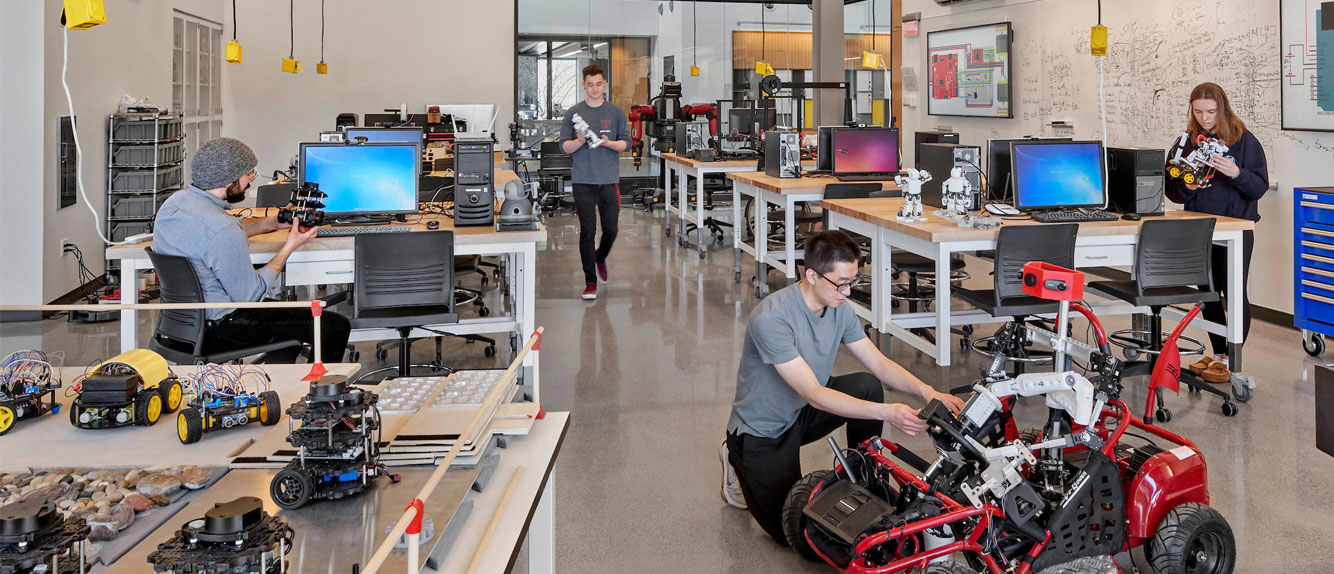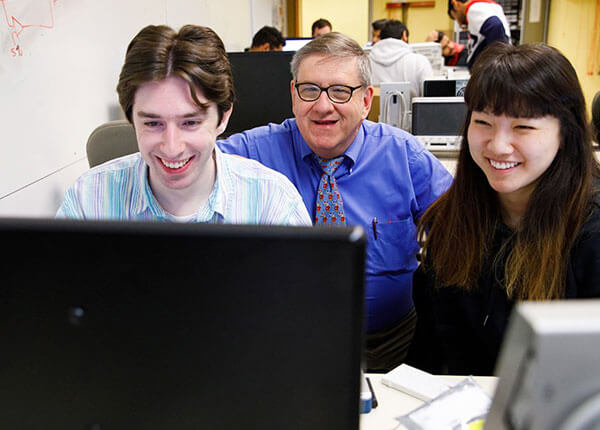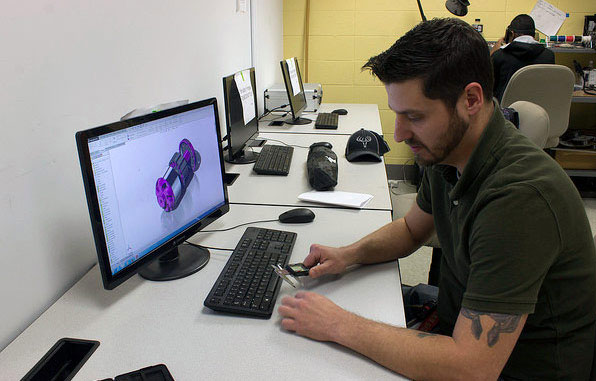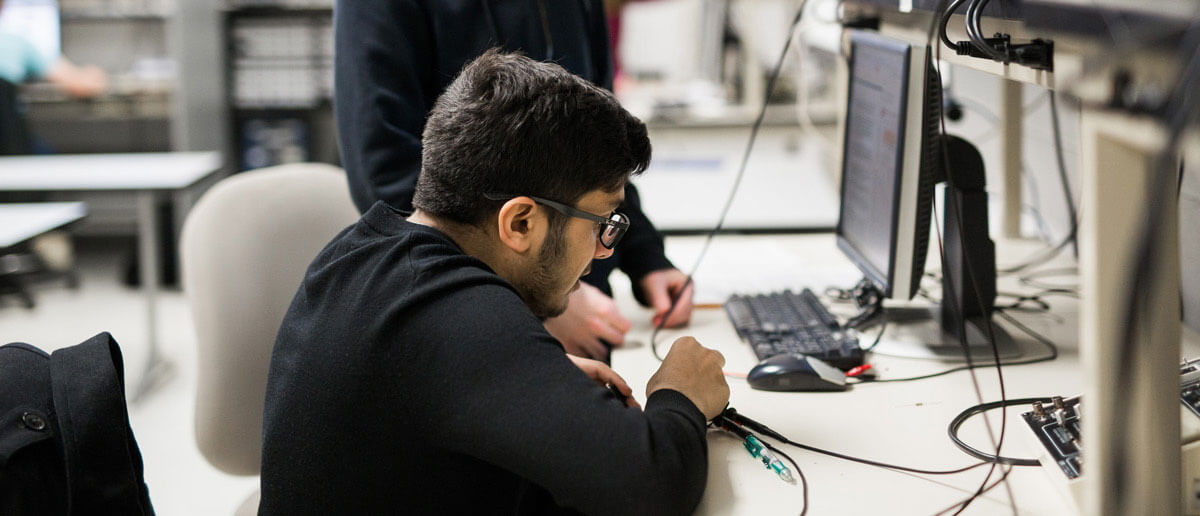
Robotics Engineering - BS
From automation to AI, robotics is revolutionizing industries. Here, you’ll see yourself here developing, programming, and testing robots — intentional preparation for putting your purpose to work.
At UHart, Electrical Engineering unlocks your potential through rigorous coursework and real-world design experiences. With intentional preparation in circuits, power systems, communications, and electronics, you’ll graduate success ready to solve complex challenges and become an effective leader in engineering. See yourself here shaping the technologies that drive innovation.
Bachelor of Science
127
The Electrical Engineering program covers a branch of engineering concerned with generating, distributing, processing, coding, transmitting, receiving, and deciphering electrical and electromagnetic signals.
Ready to take the next step and officially become a Hawk?
Deposit today.
Questions?
Contact Program Director Patricia Mellodge for more information.

Electrical engineering involves the study and application of electricity and electronics. It consists of a wide range of fields including electronic circuits, digital computing, robotics, sensors and instrumentation, electrical power, telecommunications, photonics, control systems, wireless communications, signal processing, and integrated circuits. BSEE graduates may obtain a professional license as a professional engineer (PE).
For more information, and to see a complete list of degree requirements, visit the Course Catalog.
In addition to the required professional electives, seniors must choose a sequence of courses in one of the following areas: VLSI, controls, communications and signal processing, electric power, computer systems, robotics, or system simulation. Both the required courses and the sequences are designed to achieve breadth and depth in the curriculum. The integrated design experience is obtained in a two semester senior capstone design project, which have increasingly are becoming industry sponsored.
The ability to work professionally on electrical systems, including the design and realization of such systems, is demonstrated by the progression of courses from introductory to comprehensive, including design components. It also includes some technical elective courses students may choose.
Through participation in the All-University Curriculum and in additional elective courses in the humanities and/or social sciences, students are given the opportunity to broaden their knowledge base and to participate in the larger learning community of the University.
CETA offers a five-year plan for students interested in completing two undergraduate degrees in audio engineering technology and electrical engineering. Interested students should contact their academic advisor of the program they are accepted into to discuss this option.

Our electrical engineering program is designed to prepare you for career success.
Electrical engineers work in a wide range of industries using skills that range from basic circuit theory to complex signals, systems, and project management. The tools and equipment consist of instrumentation such as a voltmeter, oscilloscope, spectrum analyzer, logic analyzer, waveform generator, and motor/generator assemblies to high-end test equipment and sophisticated design/manufacturing software applications.
Our graduates go on to work at companies like Bucher Emhart Glass, Eversource, General Dynamics Electric Boat, Goodrich Corp., Hamilton Sundstrand, Otis, Pratt & Whitney, Raytheon Technologies, and Sikorsky.
The minor is designed to provide students matriculating in bachelor’s degree programs in other Colleges of the University, particularly the sciences and the other engineering majors, with an introduction to the discipline of electrical engineering.
The Bachelor of Science in Electrical Engineering is accredited by the Engineering Accreditation Commission of ABET, under the commission’s General Criteria and Program Criteria for Electrical, Computer, Communications, Telecommunication(s), and Similarly Named Engineering Programs.
During their careers, electrical engineering graduates will:
To achieve these objectives students are given a rigorous foundation in mathematics, physics, chemistry, mechanics, programming, digital systems, and circuit theory. They are then immersed in a sequence of required courses in microprocessors, electronics, electromagnetics, signals and systems, and design practice. In the senior year, Digital Signal Processing, Random Signals and Noise, and Design II (senior project) are required courses, In addition, students choose a sequence of courses in one of the following areas: communications and signal processing, computer systems, control systems, electric power, and microelectronics.
Students must complete a 4-credit lecture and laboratory course in general chemistry. Students also must complete two 4-credit lecture courses in calculus-based physics (including laboratory components), thus meeting the depth requirement.
Students also take M 242 Differential Equations (3 cr.), M 240 Calculus of Several Variables (4 cr.), and M 220 Linear Algebra (3 cr.). Students should have several electrical engineering courses that integrate mathematical skills and should have these courses as co- or prerequisites. Electrical engineering students also take a stand-alone probability and statistics course, ECE 420 Random Signals and Noise.
The ability to work professionally on electrical systems later, including the design and realization of such systems, is demonstrated by the progression of courses from introductory to comprehensive, including design components. It also includes some technical elective courses students may choose in each stem. These are not all offered at the same time, but there are selections from each stem available in each semester of the senior year. In addition, the final capstone sequence contains projects that usually involve material from each area.
Our senior capstone projects increasingly are becoming industry sponsored. Traditionally, instruction in the design of electrical systems is provided in a sequence of courses: VLSI in ECE 565 and ECE 567, controls in ECE 442 and ECE 543, communications in ECE 423, ECE 424, ECE 521, and ECE 540. Both the required courses and the sequences are designed to achieve breadth and depth in the curriculum. The integrated design experience is obtained in the senior capstone project (ECE 483 Design II).
Through participation in the All-University curriculum and in additional elective courses in the humanities and/or social sciences, students are given the opportunity to broaden their knowledge base and to take part in the larger learning community of the University.
Extensive laboratory work supplements the theoretical course work through hands-on experience. In addition to the laboratories in the sciences, there are several required laboratory courses in engineering: Circuits I and II, Electronics I and II, Digital Logic, Microprocessors, and Digital Signal Processing. Students exercise their verbal and technical writing skills in a required writing course as well as in many engineering courses. Also, written and oral communication of laboratory results is required.
The engineering design experience is distributed throughout the entire curriculum. The design experience begins in the first year and continues throughout the curriculum, culminating with the senior capstone project.
The student learning outcomes of the electrical engineering program leading to BSEE degree are aligned with the student learning outcomes of ABET EAC (1 through 7), and prepare graduates of the program to attain the program educational objectives.
Student outcomes (1) through (7) are articulated as follows:
(1) an ability to identify, formulate, and solve complex engineering problems by applying principles of engineering, science, and mathematics
(2) an ability to apply engineering design to produce solutions that meet specified needs with consideration of public health, safety, and welfare, as well as global, cultural, social, environmental, and economic factors
(3) an ability to communicate effectively with a range of audiences
(4) an ability to recognize ethical and professional responsibilities in engineering situations and make informed judgments, which must consider the impact of engineering solutions in global, economic, environmental, and societal contexts
(5) an ability to function effectively on a team whose members together provide leadership, create a collaborative and inclusive environment, establish goals, plan tasks, and meet objectives
(6) an ability to develop and conduct appropriate experimentation, analyze and interpret data, and use engineering judgment to draw conclusions
(7) an ability to acquire and apply new knowledge as needed, using appropriate learning strategies.
Program Specific Criteria are as follows:
(PSC-1) Graduates have a knowledge of probability and statistics, including applications.
| Academic Year | First-Year | Sophomore | Junior | Senior | Total Graduates |
|---|---|---|---|---|---|
| 20-21 | 19 | 29 | 20 | 26 | 20 |
| 19-20 | 26 | 22 | 16 | 31 | 22 |
| 18-19 | 18 | 22 | 19 | 33 | 23 |
| 17-18 | 11 | 18 | 19 | 24 | 22 |
| 16-17 | 19 | 17 | 19 | 28 | 17 |
Electrical Engineering, 2025
Electrical Engineering student Benjamin Chern ’25, always had a passion for technology research and discovered that the extracurricular learning opportunity at UHart has been beneficial for helping him deepen his learning. Read more.
Since the student body is smaller, I am able to connect and study with most of the other electrical engineers in my class and work on assignments with them.
The program is designed to allow full-time engineering students to earn their Bachelor of Science (BS) and Master of Engineering (MEng) degrees in five years of study. Two graduate-level courses taken in the undergraduate program may be applied to both undergraduate and graduate degree requirements. Students usually commit to the program at the start of the second semester of their junior year, and juniors who are interested should contact their department chair.
In order to be accepted into the program, students must have a 3.0 cumulative grade point average at the end of the junior year (below 3.0 will be considered on a case-by-case basis).
Contact Laurie Granstrand to learn more.

From automation to AI, robotics is revolutionizing industries. Here, you’ll see yourself here developing, programming, and testing robots — intentional preparation for putting your purpose to work.


This program emphasizes practical, hands-on learning that unlocks your potential to work directly with today’s electronic and computer-based systems. With intentional preparation focused on application and implementation, you’ll graduate success ready to support, test, and improve real-world technologies. See yourself here turning knowledge into action.